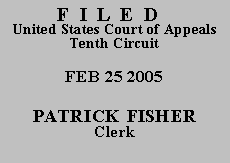

|
LARRY FRANCIS DURDEN, |
|
Before EBEL, MURPHY, and McCONNELL, Circuit Judges.
Durden filed the instant § 2254 petition on October 29, 2003. In the petition, Durden asserted claims against the parent of the victim, a claim that his counsel provided him with constitutionally ineffective assistance, a claim that his guilty plea was not made knowingly and voluntarily, and a claim that records from a prior California conviction are either erroneous or have been altered. Respondent moved to dismiss the § 2254 as untimely. The district court granted Respondent's motion, concluding that Durden's petition was filed outside the one-year limitations period and that Durden was not entitled to any tolling of the limitations period.
In his appellate brief and application for a COA, Durden does not argue that his § 2254 petition was filed within the one-year limitations period. 28 U.S.C. § 2244(d)(1)(A). Instead, he argues that the one-year limitations period is unconstitutional. After reviewing the record, we reject Durden's argument that applying the limitations period in this case rendered the habeas remedy inadequate or ineffective. See Miller v. Marr, 141 F.3 976, 978 (10th Cir. 1998).
To be entitled to a COA, Durden must show "that jurists of reason would find it debatable whether the district court was correct in its procedural ruling." Slack v. McDaniel, 529 U.S. 474, 484-85 (2000) (holding that when a district court dismisses a habeas petition on procedural grounds, a petitioner is entitled to a COA only if he shows both that reasonable jurists would find it debatable whether he had stated a valid constitutional claim and debatable whether the district court's procedural ruling was correct). Our review of the record demonstrates that the district court's dismissal of Durden's § 2254 petition as untimely is not deserving of further proceedings or subject to a different resolution on appeal. Accordingly, we deny Durden's request for a COA and dismiss this appeal. All outstanding motions are dismissed as moot.
Entered for the Court
PATRICK FISHER, Clerk of Court
By
Deputy Clerk